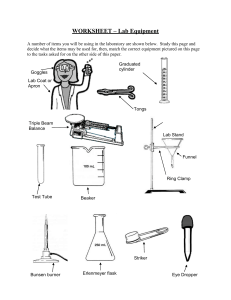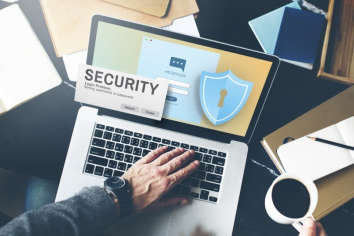- When lab safety procedures aren’t followed, people can get hurt–or worse. Lab equipment and chemicals that are improperly handled can result in personal injury and even death. Chemical spills, toxic fumes, needle pricks, and fires can harm lab workers, while errors in how medications are handled and distributed can harm patients.
- The Lab Safety Institute is a nonprofit organization providing laboratory safety education and consultation worldwide. We have taught courses to more than 100,000 people in 30 countries, spanning 130 different industries, including research, high-tech, government, medicine, and academia (STEM educators).
- Laboratory Safety. The Laboratory Safety program supports EHS's Mission by providing guidance and support to researchers in order to identify and eliminate or reduce hazards, train personnel, and ensure compliance with local, state and federal regulations.
The Importance of Lab Safety—in School and in Your Career
Posted: May 12, 2015
Laboratory Safety Standards are in use in clinical and chemical labs, testing labs, and research and development labs in both industrial and educational facilities. Lab safety standards pertain to protective clothing and equipment such as lasers, as well as procedures and lab designs that promote safety. Back to Workplace Safety Standards Home. Basic safety rules for laboratory conduct should be observed whenever working in a laboratory. Many of the most common safety rules are listed below. Know locations of laboratory safety showers, eyewashstations, and fire extinguishers. The safety equipment may be located in the hallway near the laboratory entrance.
Any job you work at comes with its own safety hazards. When you work in a lab—like those who work in healthcare, trades, and more—you must be mindful of the chemicals and tools you’ll encounter that may cause serious injury if handled improperly. Therefore, it’s important to always follow lab safety procedures.
Whether you’re on the job or just learning, lab safety is priority number one!
Online medical assistant students already working in their careers know that the safety precautions they take in the laboratory could actually save someone’s life. However, did you know that lab safety begins with your online career training?
We at Career Quest Learning Centers are dedicated to the safety of our Michigan, Ohio, and Indiana students. That’s why lab safety is always taken seriously. We know that what you learn during your education will stay with you throughout your career.
What Is Lab Safety?
Working in a lab often means you’re surrounded by chemicals and other hazardous materials. Lab safety is all about being aware of your surroundings as well as cultivating a specific skillset that is used to keep you, your peers, and the lab safe.
Lab safety is often broken down into smaller components, like recognizing hazards, minimalizing risks, and more.
How You Can Be Safe in the Lab
When practicing lab safety, one of the ways you can ensure the safety of you and your colleagues is to recognize any potential hazards. If you’re working in a lab with flammable chemicals, know where these chemicals are located and where emergency supplies are in case a fire breaks out.
Another way you can practice lab safety is by minimizing risks. This includes wearing proper lab equipment, handling waste properly, and working in a safe environment.

The Importance of Practicing Lab Safety
There are many reasons why it’s important to practice lab safety while both in school and in your career. We’ve listed just a handful of reasons discussing the importance of lab safety. Here are some of the most important.
It really can save lives.
We’ve already talked about the importance of minimizing lab risks. When these steps aren’t taken, something may go wrong.
When lab safety procedures aren’t followed, people can get hurt–or worse. Lab equipment and chemicals that are improperly handled can result in personal injury and even death. Chemical spills, toxic fumes, needle pricks, and fires can harm lab workers, while errors in how medications are handled and distributed can harm patients.
Lab safety protects property.
Fires can occur when lab safety procedures are not followed. Chemicals that are improperly stored or handled can react with one another to cause fires and explosions. The subsequent property damage can affect the lab, all the work performed there, and all the people depending on what that lab does.
It protects equipment.

It may seem like extra work to clean and store that microscope to the exacting standards that your instructor insists upon, but it’s that way for a reason. Taking care of equipment ensures that it does the job it needs to, while extending its usefulness for as long as possible.
Proper lab safety prevents cross contamination.
Disease and bacteria are spread when lab procedures are not followed. The instruments used by students and professionals must be fully cleaned and sterilized to prevent the dangerous spread of these diseases and bacteria.
It ensures accurate recordkeeping.
Whether you’re a medical assistant, pharmacy technician, or researcher in a lab, the records you keep are vitally important. Proper lab safety ensures that patient information, procedures, and medications are accurate, up to date, and available to all the healthcare professionals treating the patient or researchers working on a project.
Lab safety helps the facility and the profession.
Proper lab safety ensures the good reputation of the lab, healthcare facility, clinic, or pharmacy you work in. When people believe you work in a professional and safe environment, they’re more likely to trust you and what you do. What you do for your individual employer also reflects well on the industry as a whole.
Start a Career in Lab Work
There are lots of different careers that entail working in a lab to varying degrees. If you pursue a career as a phlebotomist, you may work in an in-house lab facility that runs bloodwork for patients. As a medical assistant, you may run diagnostic tests in the hospital you work at.
Lab Safety & Measurement Unit Miss E. Mac's Class C
No matter what career path you take, proper lab safety is essential.
Lab Safety & Measurement Unit Miss E. Mac's Class A

At Career Quest, we not only teach the necessary skills and information needed to succeed in your new career, but we also teach proper lab protocols to ensure the safety of you and your surroundings.
Career in Healthcare
No matter which career path you take within the healthcare field, chances are you’ll be in some sort of lab environment. With so much variety among this field, we offer several different certificate and degree programs—some of which are taught online.
Our healthcare programs include:
Lab Safety & Measurement Unit Miss E. Mac's Class Of
- Medical assistant
- Ophthalmic assistant
- Certified nurse aid (CNA)
- Medical billing & coding
- Medical office administration (AAS)
Gain Lab Experience Before Graduating
Many of our healthcare programs include externship opportunities. This way, you can get real-world, hands-on experience within this field before you graduate. As you start your job search, local employers will look favorably upon this foundation of externship experience.
Learn More About Lab Safety Today
Lab Safety & Measurement Unit Miss E. Mac's Classic
Lab safety is essential for dozens of reasons. At the end of the day, proper lab safety keeps you and your surroundings as safe as possible while dealing with potentially hazardous materials.
If you’d like career training that includes instruction on proper lab safety, Career Quest is here to help. With over 25 years of experience at our accredited career college, we’ve fine-tuned our education to help get you career-ready in as little as 8 months!
Our online classes are now open for enrollment for Michigan, Ohio, and Indiana students. Don’t wait any longer to contact one of our responsive admissions counselors today!
